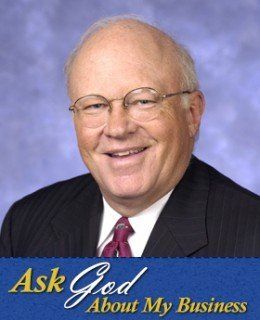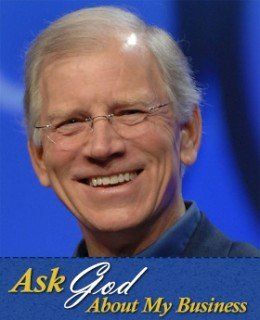7 PRACTICAL GROWTH STRATEGIES FOR PROSPERITY
![]() 1. Strategic Planning
1. Strategic Planning
In the 1980’s, Truett Cathy and his company, Chick-Fil-A, had a decline in sales for the first time since its founding in 1946. The frustration led him to take his key staff and board members to a Strategic Planning session.
After two days of talking and praying, they agreed only on one thing…their Mission Statement: “To glorify God by being a faithful steward of all that is entrusted to us to have a positive influence on all who come in contact with Chick-Fil-A.”
The employees chipped in to buy a bronze plaque of the Mission Statement for Truett, who secured it near the front door of their new headquarters building. Since that one act, sales growth took off, heading toward $2 billion this year.
President Dwight Eisenhower once said, “Plans are often worthless, yet the planning process is priceless.”
God blesses companies based on their effective communication, relationships, love, calling, and talents aligning with His plan and grace. We have researched the Bible and uncovered the Cornerstone Paradigm. This is a planning process that defines the Solid Foundation the Bible describes for each of us and our businesses.
In a problem-solving session, Jim Failor remarked about the absence of a key member of our team. This man with great insights said, “CEOs do what they want to do.” In other words, it’s about our priorities and whom we report to…ourselves…or God and His calling.
The biggest time trap for entrepreneurs is picking up monkeys from their employees. Per the legendary Bill Oncken, “Too many executives back into the future, keeping their eyes on those things they have done well or love to do (pick up the decisions of their subordinates) rather than turning around and facing the future…those things they still do not know how to do, but face the future with a willingness to fail and humbly grow from them.”
A personal trust and relationship in Jesus Christ is about stepping out in faith (risk) and allowing Him to lead when it doesn’t always make logical sense. He is the priority.
2. Marketing Principles
Sound business economics says any business can be good at Quality, Service, or Price. But you can only be best at 2 out of 3. You pick which two. You can’t have the best quality and service and have the best price. To have the best price, you have to sacrifice at being the best at quality or service. You can’t have all three and make money. Wal-Mart and others try, but it never works.
The key point here is that in marketing your product or services, you need to find your niches and not try to please everyone. This perspective is totally harmonious with the Bible. God has a special plan for each of our businesses and us. It means to be unique in the market, find the things that set you apart from your competition.
This is about finding your calling––God’s plan, niche, and purpose for your service to Him and your fellow man. Once you know the calling, the passion will be created by Him and the marketing strategy will become clearer and clearer. Test market your plan with your Advisory Group.
In the 1980’s, Larry Bird took a lackluster Boston Celtics team from obscurity to the playoffs, and in the second year, to an NBA championship.
Every organization needs outstanding people in “Game Breaker” positions, i.e., sales manager, CFO, Quality Control, EVP…you decide for your organization.
Too often top executives make the mistake of hiring too fast and terminating too slowly. Because CEO’s don’t hire often enough, they never get good at it. They often hire the best of a few choices but rather, should find more candidates, become more patient, pray for God to send good candidates before and during the process, interview and screen three different ways and take your wife and the best candidate’s wife to dinner.
What the Lord has shown me about many people that fit long term. I like xxxx people and many times I have prayed, “Lord should I hire this person?” Most often I hear “Yes.” Sometimes that’s self will, often times I am certain it’s from the Lord. But here’s what I’ve recognized
God Loves Everyone
. I hire people who don’t work, not for what they can do to help us, but how I can minister to them into their life. *Some people are here for a reason, to prepare them for the next step God has for them. Others are let go for the value of their “wake-up call.” Many need that and God wants to break all of “our will” to prepare us for “His will” to be done. It’s part of the Journey to each of us. Key for Hiring Key Executives is getting confirmation from outsiders, yet multiple opinions. Do not just trust you always.
In the 1970’s, a national talk show host named Mike Douglass interviewed a top sales trainer named “Wayne.” Immediately, Mike asked Wayne to sell him the ashtray on the coffee table. Wayne asked Mike, “Why would you want to buy it?” Mike gave three or four reasons (looks, practical use, and size). Wayne then asked, “What would you be willing to pay for it?” Mike thought for a while and explained why he would be willing to pay $75. Wayne said, “Sold.”
As simple as that example is, too many of us forget how critical the interview or question stage in a sale is because we are too busy explaining all the features and benefits without getting into the head/need of the prospect.
The real purpose of sales is to HELP someone fulfill a need. It’s as simple as the Golden Rule…giving as Christ did. “Give and it is given unto you,” (i.e., in referrals, demonstrating rapport, trust, and relationship building).
The greatest power and motivation in any business is through love. Love defined not as the physical type, but as empathy, caring, serving, and praising. Love and the Golden Rule is what drives the success of American marketing and customer focus. We follow leaders. As employers, we have to deal with the heart and soul of those we employ in attempting to motivate them. Reference: Where does motivation begin?
Wes Cantrell, CEO of Lanier Worldwide, says his father was his inspiration in life. As a pastor, His father had been terminated by his church in a shocking course of events. Friends encouraged his father to be bitter, get back at them, and hold onto resentment. Instead, he was forgiving and later went back to the same church to teach Sunday School as a volunteer for many years. Wes says, my father was my greatest inspiration and motivation in building my faith and relationship with Christ.
Experts agree motivation comes from within…from our heart and spirit. We never make a major decision without feeling the sensitivity of our heart. We are motivated to work, follow orders, desire to love…or to skip work, call in sick, rebel against the boss’s desires, or harbor resentment.
Without the cleansing love, forgiveness, and full acceptance of Christ abiding IN our heart, we experience turmoil or lack of peace over many key decisions or situations.
So, our motivation, desires, and emotions are subject to the peace or conflicts in our heart, in other words, the spiritual condition of our heart.
As an overview, the Bible looks at motivation in two ways:
Manipulation (rules, standards, discipline, culture)
Inspiration (heartfelt desire to do something)
Because of the sinful nature we inherit at birth, the Lord used manipulation by the Ten Commandments to create an environment to encourage us on what NOT to do and what to do.
Yet He would much prefer to work through the Love of the Holy Spirit to Inspire our hearts (convict each of our hearts to follow His ways and plans). If we are not led by the spirit, the battle between our Soul and Spirit keeps us in conflict, in the self-centered nature–– condemned to not change or step out in faith. We are then more moved by fear, pride, envy…being in control rather than love, peace, faith, and joy.
In a business, motivating employees is about creating a culture where they are convinced to work and live by your rules, environment, teamwork, and to win together (manipulation). Manipulation by using the Golden Rule and love of Christ in us plus vision, purpose, winning by being on a loving team.
True motivation comes from the principles of God. The most peaceful inward motivation is a result of a daily pursuit of Him and His calling on our business and lives.
Refer to more articles and tapes in the Wise Counsel Network.
J.C. Penney believed that the best course for business was the Sermon on the Mount (Matthew). He said, “If we just follow the principles of Christ, we will win the loyalty of our customers, go the second mile, give and it will be given back to us, and we will serve them well. In the long run, we will win many friends.
Today the great threat to good customer service may be the automated phone answering service––making attempts at satisfying the customer very impersonal.
Why Customers are Lost (accredited to University of Michigan and American Society for Quality Control)
Every employee is in sales or customer service. So the key is to get everyone involved to buy into the boss’s passion for serving the customer.
One more template I found for every employee (especially customer service) is:
A Short Course in Human Relations
Obviously, customer service training is critical to good service. Make sure your people stay focused.
Barry Schimel, CPA and National Consultant from Rockville, Maryland, and author of “100 Ways to Win the Profit Game,” says you can’t expect to increase your sales enough to work out of a cash flow problem. Your best alternative to find more cash is to cut your overhead and other costs using the participation of your people.
Ken Blanchard, author and consultant, talks about having to cut $350,000 from the budget without dropping staff after the 9/11 down of 2001.
Nick Simonic, CPA with his own weekly talk show, says as a Christian businessman that cash flow and profit reflect our attitude toward stewardship and our time in prayer. Cash flow relates to our faithfulness to our calling and His plan, not our own.
Man’s greatest fear is the pride of being embarrassed
In pure business logic, if you have $1 million in sales and if you grow by 100%, then your sales are $2 million. Right?
Not necessarily. God’s math is only the same when He wants it to be. Since “He is in control of everything on heaven and earth,” our logic often goes out the window. Our alignment with his principles and calling are key.
He uses pain, frustration, adversity, and suffering to teach us new things. Business Owners/Executives losing money is very painful and alarming. We are losing control (man’s greatest fear is the pride of being embarrassed).
The fishes and loaves to feed the multitudes is a perfect illustration of His point.
- When we have stepped out in faith in His perfect will/plan, the money will flow in His timing (sales close that we didn’t really work for.)
- But when He wants our attention over our mistakes, the cash flow squeeze sounds the alarm and up goes our antenna. We will search for answers.
Through the years of difficult business, I’ve had to work out a financial problem because I was off track (out of His grace). But as I work toward getting back into “His good graces,” through pain, prayer, and hard work, the cash flow gradually reappears…even when I didn’t yet deserve it.
As an example, Hugh Jones, former CEO of a major bank in Florida, tells about the slowness of growth and the incompatibility of his staff in performing to his expectations. Yet, a highly respected colleague recommended a mission, which seemed to have no relevance. To get his staff involved in volunteerism through various community activities.
Gradually, out of his own desire to give back and be a leader in the community, things began to change internally as well. As his staff became involved together, their attitude and sense of teamwork improved. The new camaraderie that developed resulted in improved bank performance. Increase communication brought a new level of mutual respect, even new passion, in their city.
At the same time, the bank’s income grew and profits doubled with no increase in their sales effort. Hugh Jones sensed a spiritual anointing in what became one of the best all-around banks in the nation.
God honors those who give––whether we are feeding the flock in faith, as Jesus did, or giving to our community.
This is merely an example of getting into alignment with His plan and calling. He is our cash flow provider and our source.

![]() 1. Strategic Planning
1. Strategic Planning




